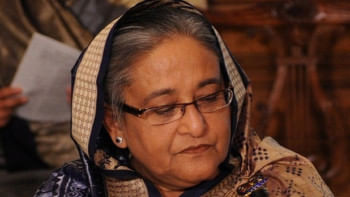Nursery sales see massive drop

Nurseries across Bangladesh saw a massive drop in sales in the last four months due to the rising cost of living along with higher production costs and low rainfall.
According to nursery owners, the hike in labour, fertiliser and transport costs has increased their overall production costs. As a result, prices of their plants have inflated between 5 and 50 per cent while sales have declined by 25 to 30 per cent.
Mainul Islam, manager of the Sabuj Bangla Nursery in Dhaka's Agargaon, one of the biggest nurseries in the capital, said sales have decreased by about 30 per cent in the last four months compared to the same period in 2021.
"The rising cost of living and higher price of plants are among the reasons behind the decline in sales since April this year," he said.
"In the current situation, we are fearing that sales may fall further in the coming days," Islam added.
Mohammad Alauddin, general manager of the Barishal Nursery in Savar, said they are suffering for low demand.
"Last year, we sold around one lakh saplings, but it may fall drastically. We were compelled to hike prices due to the increase in production cost," he added.
Alauddin went on to say they would buy a truckload of soil for Tk 2,400 in 2021 but the price has since reached Tk 3,500 at present. At the same time, the price of one van of cow dung has increased from Tk 4,000 to Tk 5,000.
Mohammad Khokon, managing director of Diploma Krishibid Nursery at Sher-E-Bangla Nagar in Dhaka, said their sales have decreased 25 per cent in the same period.
Labour costs have grown by 15 per cent while fertiliser prices shot up by 15 to 25 per cent in the last ten months, Khokon added.
SM Shahnewaz Momtaz Chowdhury, senior manager (nursery) at BRAC's head office, said retail sales have fallen by 20 per cent in the last few months due to the current situation and lower rainfall.
Currently, BRAC operates 15 nurseries that are located across Bangladesh.
According to the Bangladesh Meteorological Department, the average rainfall in July was 211 millimetres (mm), which was 57.6 per cent lower than the average rainfall in that month for the last 30 years and lowest since 1981.
The average 30-year rainfall was 496mm.
In 2020, it was 553mm, which was 11.3 per cent higher than the average, while it was 471mm, or 5.1 per cent lower, last year.
Following the economic shocks brought on by Covid-19, sales of nurseries operated by corporations have reached 60 per cent of pre-pandemic levels while that of NGOs has recovered fully, Chowdhury said.
Nazrul Kabir, general secretary of the Bangladesh Nursery Owners Association (BNOA), said there is an organised market for plants, saplings and trees in many developed countries but there is no such market in Dhaka.
"If the government takes the initiative to set up an organised market, it will bring good for this sector and the environment," he added.
Meanwhile, nursery sales have also decreased outside Dhaka.
Moloy Lal Dhar, owner of Sylhet Nursery at Dariapara in Sylhet, said sales have halved due to the rise in living costs.
"People who used to buy trees worth Tk 1,000 earlier are now buying trees worth Tk 400-500 a month," he added.
Abdur Rashid, manager of the Shanta Nursery located next to the Forest Department Laboratory in Chattogram's Sholshahar area, said the sale of fruit cultivated in rooftop gardens has decreased a lot.
At the same time, the sale of fruit bearing and forest trees is also low.
Similarly, the sale of saplings has come down a lot compared to before, according to many nursery traders in Chattogram.
As per BNOA data, about Tk 250 crores worth of plants are sold annually in the country and over one lakh people are employed by the sector.
There are more than 18,000 registered nurseries in the country, according to the Department of Agricultural Extension.


 For all latest news, follow The Daily Star's Google News channel.
For all latest news, follow The Daily Star's Google News channel. 



Comments